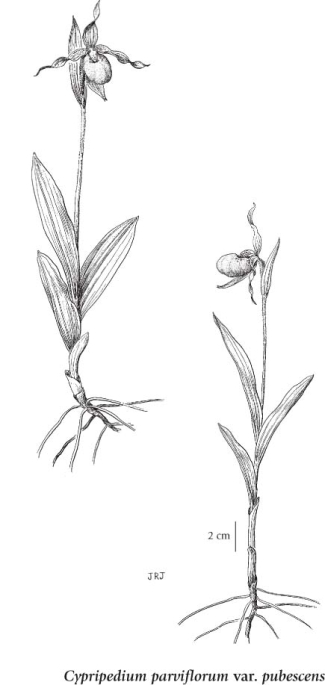Cypripedium parviflorum var. pubescens Salisb. (Willd.) Knight
yellow lady's slipper (greater yellow lady's slipper)
Orchidaceae (Orchid family)
Introduction to Vascular Plants
yellow lady's slipper (greater yellow lady's slipper)
Orchidaceae (Orchid family)
Introduction to Vascular Plants
Map
Distribution of Cypripedium parviflorum var. pubescens
Click here to view the full interactive map and legend
Species Information
General:
Perennial herb from slender rhizomes, with coarse, fibrous roots; stems 10-50 cm tall, glandular-hairy, leafy.
Leaves:
Stem leaves 3 to 5, lanceolate to elliptic, 5-15 cm long, 3.5-6 cm wide, ribbed, the base sheathing.
Flowers:
Inflorescence usually of a single, showy flower; sepals greenish-yellow to purplish or purple-veined, 3-5 cm long, 1-2 cm wide, upper sepal broadly lanceolate, the lower sepals united, pendant behind lip; lateral petals narrower than but otherwise similar to upper sepal, sometimes twisted, 3.5-5 cm long; lip balloon-like, generally egg-shaped, 2-3.5 cm long, yellow, often purple-spotted on inside especially near mouth, mouth puckered, margin in-rolled.
Fruits:
Capsules, erect, ellipsoid, ribbed, glandular-hairy.
Notes:
C. x columbianum Sheviak, a hybrid of C. montanum and C. parviflorum var. pubescens, is known from BC and the adjacent NW U.S.A. (see notes under C. montanum). Two varieties of C. parviflorum occur in BC var. makasin and var. pubescens. Some authors (e.g., Cribb 1997) include var. makasin within var. parviflorum, a variety not found in BC
1. Outer surface of sheathing bract sparsely hairy to smooth, when young; intense sweet scent................. var. makasin (Farwell) Sheviak
1. Sheathing bract densely hairy when young; moderately scented................. var. pubescens (Willd.) Knight
Illustration

If more than one illustration is available for a species (e.g., separate illustrations were provided for two subspecies) then links to the separate images will be provided below. Note that individual subspecies or varietal illustrations are not always available.
Illustration Source: The Illustrated Flora of British Columbia
Ecology
Ecological Framework for Cypripedium parviflorum var. pubescens
The table below shows the species-specific information calculated from
original data (BEC database) provided by the BC Ministry of Forests and Range.
(Updated August, 2013)
The table below shows the species-specific information calculated from
original data (BEC database) provided by the BC Ministry of Forests and Range.
(Updated August, 2013)
| Site Information |
Value / Class |
||
|
Avg |
Min |
Max |
|
| Elevation
(metres) |
605 | 500 | 710 |
| Slope
Gradient (%) |
0 | 0 | 0 |
|
Aspect (degrees) |
0 | ||
| Soil
Moisture Regime (SMR) [0 - very xeric; 4 - mesic; 8 - hydric] |
7 | 7 | 7 |
| Modal
Nutrient Regime
Class |
B | ||
| #
of field plots species was recorded in: |
2 | ||
| Modal
BEC Zone Class |
ICH | ||
|
All BEC Zones (# of stations/zone) species was recorded in |
ICH(2) | ||
|
Source:
Klinkenberg 2013
|
|||
Habitat and Range
Moist to mesic streambanks, river terraces, thickets, and mossy bogs and swamps in the steppe and montane zones; infrequent E of the Coast-Cascade Mountains; var. makasin - N to YT and NT, E to NF and S to ME, MA, PA, IN, IL, IA, ND, CO and CA; var. pubescens - N to AK and YT, E to NF and S to ME, MA, PA, GA, AL, MS, KS, NM, AZ and WA.Synonyms
Synonyms and Alternate Names:
Cypripedium calceolus subsp. parviflorum
Cypripedium calceolus var. planipetalum (Fern.) Victorin & Rouss.
Cypripedium calceolus var. pubescens (Willd.) Correll
Cypripedium furcatum Raf.
Cypripedium planipetalum (Fernald) Morris & Eames
Cypripedium pubescens Willd.
Cypripedium pubescens var. pubescens Willd.
Taxonomic Notes
This is a beautiful native hardy lady's slipper orchid with a golden yellow pouch and twisted purple to burgundy petals. The flowers are faintly scented (fruity to vanilla). A very choice plant for the partial shade of a woodland garden in a well-drained humus-rich soil. Once considered to be the circumboreal C. calceolus (which occurs in Europe and Asia), now our North American plants are considered to be their own closely related species, C. parviflorum. Large plants, great value.
Note Author: Gary Lewis, Phoenix Perennials |